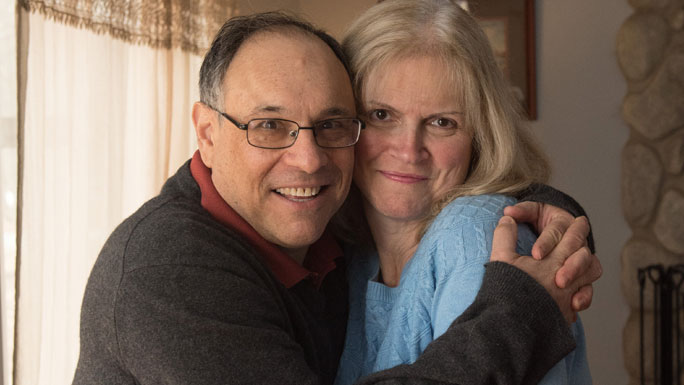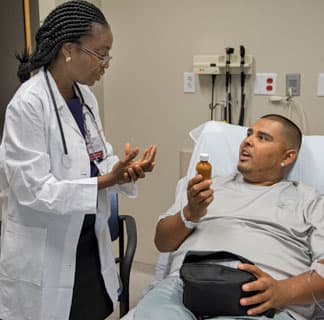Cancer researcher becomes cancer patient

Scientist colorectal cancer.
“Now as a cancer survivor, I have become a passionate advocate for cancer screening,” said Karczmar, 64. “I tell everyone: ‘get screened.’ Screening can find cancer earlier, when it’s more treatable and cure rates are higher.”
After getting his diagnosis, Karczmar turned to the cancer specialists at the University of Chicago Medicine. As a researcher for Aytekin Oto, MD, performed MRI scans, which determined the extent of the cancer and ruled out metastatic disease. Medical oncologist Blase Polite, MD, and radiation oncologist Stanley Liauw, MD, collaborated on the first phase of treatment — a six-week course of image-guided radiation and chemotherapy — which treated the tumor and other areas in the pelvis where the disease was likely to spread.
Colorectal surgeon Neil Hyman, MD, then performed a surgical procedure called a low anterior resection (LAR) to remove the portion of the rectum that contained the cancer, ensuring that no hidden cancer remained and minimizing the chance of recurrence. When John Hart, MD, an expert in gastrointestinal pathology examined the removed tissue, no residual cancer was found.
A temporary ileostomy – a small opening in the belly to allow stool to leave the body – was put in place to give the rectum time to heal. A few months later, Hyman reversed the ileostomy, allowing for normal bowel function.
Throughout the yearlong treatment, Karczmar worked in his lab as much as he could, even getting a National Institutes of Health grant for a research project with Oto to improve prostate cancer screening.
Karczmar says he’ll never forget the attention and support he received from the doctors, nurses, dietitians, support staff and coworkers at the hospital. Connecting with fellow cancer patients through a support group helped him maintain a positive attitude. His wife, Kelly, and two daughters, Sasha and Allie, kept up his spirits during his treatments and while he was recovering at their home in south suburban Crete, Illinois.

"My family gave me a free ride for the year,” he said. “Our three dogs — Holly, Oakley and Maddie — would jump up on the couch and cuddle with me when I wasn’t feeling well."
Hyman calls Karczmar a great example of the importance of screening for colon cancer. “He had a colonoscopy and it saved his life,” he said.

Colorectal Cancer Care
At UChicago Medicine, colorectal cancer care is delivered by a team of experts, including specialists in medical oncology, gastroenterology, colorectal surgery, radiation oncology, genetic counseling and more. Our patients receive holistic care that balances advanced, effective treatment with the goals of preserving bowel function and quality of life.
Learn About Our Colorectal Cancer Care
Participate in a Cancer Clinical Trial
UChicago Medicine cancer experts are actively conducting clinical trials of new screening methods and treatments for cancer, including breakthrough approaches to harnessing the immune system to fight cancer. As a recognized leader in phase I and other early-phase clinical trials, our physician-scientists are creating new cancer treatment methods that later become the standard of care elsewhere.
Find a cancer clinical trial